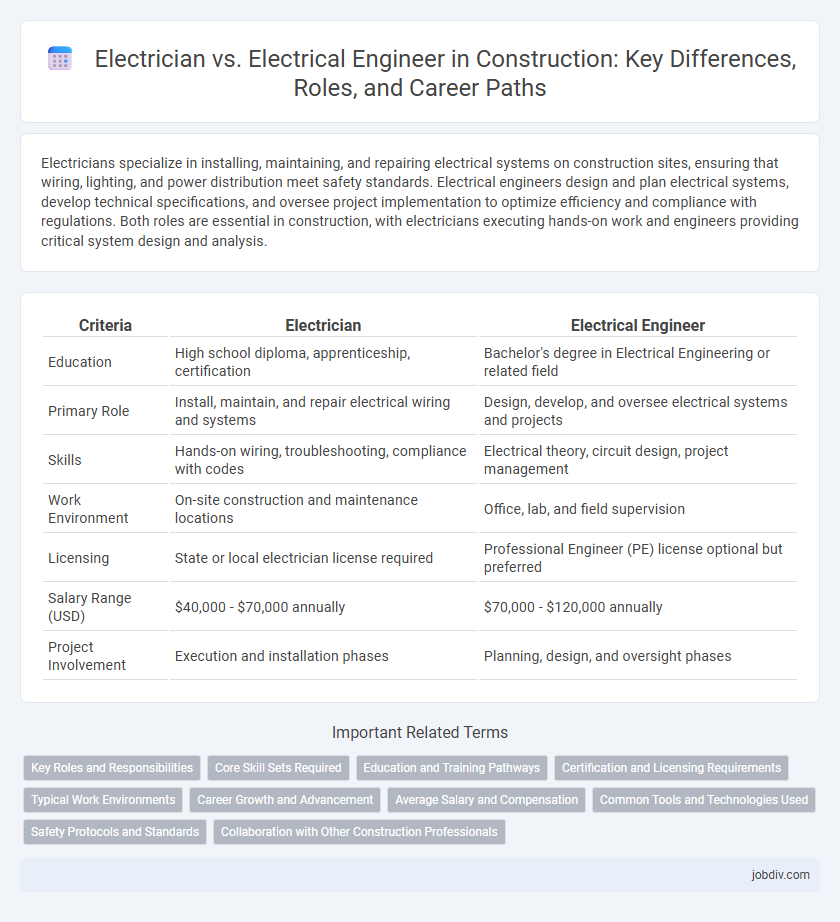Electricians specialize in installing, maintaining, and repairing electrical systems on construction sites, ensuring that wiring, lighting, and power distribution meet safety standards. Electrical engineers design and plan electrical systems, develop technical specifications, and oversee project implementation to optimize efficiency and compliance with regulations. Both roles are essential in construction, with electricians executing hands-on work and engineers providing critical system design and analysis.
Table of Comparison
| Criteria | Electrician | Electrical Engineer |
|---|---|---|
| Education | High school diploma, apprenticeship, certification | Bachelor's degree in Electrical Engineering or related field |
| Primary Role | Install, maintain, and repair electrical wiring and systems | Design, develop, and oversee electrical systems and projects |
| Skills | Hands-on wiring, troubleshooting, compliance with codes | Electrical theory, circuit design, project management |
| Work Environment | On-site construction and maintenance locations | Office, lab, and field supervision |
| Licensing | State or local electrician license required | Professional Engineer (PE) license optional but preferred |
| Salary Range (USD) | $40,000 - $70,000 annually | $70,000 - $120,000 annually |
| Project Involvement | Execution and installation phases | Planning, design, and oversight phases |
Key Roles and Responsibilities
Electricians install, maintain, and repair electrical wiring, systems, and fixtures in residential, commercial, and industrial buildings, ensuring compliance with safety codes and regulations. Electrical engineers design, develop, and test electrical equipment, systems, and components, focusing on efficiency, innovation, and large-scale electrical infrastructure projects. Both roles require technical expertise, but electricians emphasize hands-on electrical work while electrical engineers prioritize theoretical design and system integration in construction projects.
Core Skill Sets Required
Electricians require hands-on expertise in wiring, circuit installation, and troubleshooting electrical systems, emphasizing practical knowledge of electrical codes and safety standards. Electrical engineers possess advanced skills in designing, analyzing, and developing electrical equipment and systems, utilizing mathematics, physics, and software tools for complex problem-solving. Both roles demand a strong understanding of electrical principles, yet electricians focus on implementation while engineers concentrate on innovation and system optimization.
Education and Training Pathways
Electricians typically complete an apprenticeship program lasting 4-5 years that combines hands-on training with technical coursework, earning a license to perform electrical installations and repairs. Electrical engineers usually pursue a bachelor's degree in electrical engineering or a related field, involving advanced studies in circuit theory, electromagnetism, and systems design, often followed by professional engineer (PE) certification. The electrician's training emphasizes practical skills for on-site work, while electrical engineers focus on theoretical knowledge and system planning for larger-scale projects.
Certification and Licensing Requirements
Electricians must obtain state-specific licenses that typically require completing an apprenticeship and passing a certification exam focused on electrical codes and safety standards. Electrical engineers require a Professional Engineer (PE) license, which involves earning an accredited engineering degree, passing the Fundamentals of Engineering (FE) exam, gaining work experience, and passing the PE exam to demonstrate expertise in electrical system design and compliance. Licensing for electricians centers on practical installation and safety, while electrical engineers are certified for advanced technical design and regulatory adherence in construction projects.
Typical Work Environments
Electricians typically work on construction sites, residential buildings, and commercial facilities, installing and maintaining electrical systems under direct supervision. Electrical engineers are often found in offices, research labs, or industrial plants where they design, develop, and oversee electrical projects and systems. Both professions require knowledge of electrical codes and safety standards but differ significantly in their work settings and scope of responsibilities.
Career Growth and Advancement
Electricians primarily handle the installation, maintenance, and repair of electrical systems on construction sites, offering hands-on expertise that typically leads to supervisory or master electrician roles. Electrical engineers design complex electrical systems, conduct project planning, and develop innovative solutions, opening pathways to senior engineering positions, project management, and specialized fields such as renewable energy or automation. Career advancement for electricians often involves earning certifications and licenses, while electrical engineers benefit from advanced degrees and professional engineering (PE) licensure to access higher-level leadership and technical opportunities.
Average Salary and Compensation
Electricians typically earn an average salary ranging from $45,000 to $65,000 annually, depending on experience and location, with additional compensation from overtime and bonuses in construction projects. Electrical engineers command higher salaries, often between $75,000 and $110,000 per year, reflecting their advanced expertise in design, development, and project management within electrical systems. Benefits and total compensation packages for electrical engineers frequently include stock options, performance bonuses, and comprehensive health plans, surpassing those commonly available to electricians.
Common Tools and Technologies Used
Electricians commonly use tools like multimeters, wire strippers, conduit benders, and voltage testers to install, maintain, and repair electrical wiring and systems. Electrical engineers leverage advanced software for circuit design, simulation tools such as AutoCAD Electrical, and programmable logic controllers (PLCs) to design and analyze electrical systems. Both professionals rely on knowledge of National Electrical Code (NEC) standards and employ testing equipment to ensure safety and functionality in construction projects.
Safety Protocols and Standards
Electricians follow OSHA and NEC safety protocols to ensure safe installation and maintenance of electrical systems on construction sites, emphasizing personal protective equipment (PPE) and lockout/tagout procedures. Electrical engineers design systems adhering to IEEE standards and National Electrical Code (NEC) guidelines to prevent hazards and ensure long-term operational safety. Both roles prioritize compliance with safety regulations to minimize electrical accidents and ensure workplace safety.
Collaboration with Other Construction Professionals
Electricians and electrical engineers work closely with architects, contractors, and project managers to ensure electrical systems meet design specifications and safety standards in construction projects. Electrical engineers design and oversee the implementation of electrical systems, while electricians handle the practical installation, troubleshooting, and maintenance of these systems on-site. Their collaboration streamlines project timelines, enhances compliance with building codes, and ensures functional, efficient electrical infrastructure in new constructions.
Electrician vs Electrical Engineer Infographic

 jobdiv.com
jobdiv.com